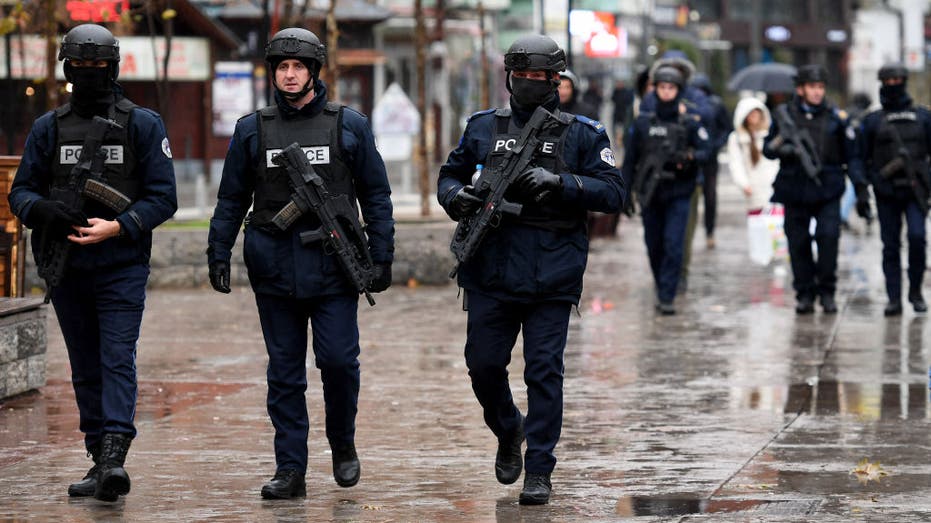
Explosions, Accusations and Tensions: The Latest Developments in Kosovo-Serbia Relations
The government of Kosovo has made serious accusations against Serbia, alleging that it orchestrated a significant explosion targeting a critical pipeline that supplies water and electricity to the predominantly ethnic Serb population in northern Kosovo. This incident has escalated existing tensions in the region, with some speculating about the involvement of Russian President Vladimir Putin.
Allegations of Russian Involvement
Ivana Stradner, a research fellow at the Foundation for the Defense of Democracies, recently spoke with *Fox News Digital* about these claims, suggesting that Serbia is acting as a facilitator for chaos in the Balkans in line with the Kremlin’s agenda. “Serbia acts as a key player in the Kremlin’s bid for chaos in the Balkans, giving Putin leverage over Western powers that aim to prevent violence from escalating in the region,” Stradner asserted.
With deep historical, cultural, and religious ties between Russia and the Balkans, these narratives are often fuelled by the Serbian Orthodox Church. Stradner further explained that Putin manipulates these long-standing divisions to destabilize the Balkans, moving the region closer to conflict while benefiting politically from the unrest.
“Vučić has developed a strategy of alternating between escalating and de-escalating crises in Kosovo,” she noted, adding that Serbian President Aleksandar Vučić positions himself as a stabilizing force while simultaneously leveraging these crises for political gain.
The Complex Nature of Allegations
Experts caution that the landscape of allegations in the Balkans can shift rapidly and may be challenging to verify. Helena Ivanov, an associate fellow at the Henry Jackson Society, remarked, “This latest escalation involves serious accusations, including claims that Serbia orchestrated the attack and suspicions of Russian involvement. Historically, many of these claims have relied on conjecture and lacked concrete evidence until thorough investigations are conducted.”
The Explosion: A “Sophisticated Operation”
Kosovo’s Prime Minister, Albin Kurti, has drawn comparisons between the pipeline attack and similar tactics employed by Russia during its aggression in Ukraine, where critical infrastructure has been targeted. While initiating a rhetoric blaming Serbia for the incident, Kurti has labeled the event a “terrorist attack,” although no evidence has thus far definitively linked Russia to this explosion.
The incident took place in the northern town of Zubin Potok, reportedly involving approximately 20 kilograms of explosives in what Kosovo’s envoy to the U.S., Ilir Dugolli, described as a “sophisticated operation” requiring significant professional expertise.
“This attack is yet another example of Serbia’s aggression,” Dugolli stated, implying that the Vučić administration may be utilizing organized crime networks to sow instability in Kosovo.
Denying Accusations and Calling for Investigations
In a firm rebuttal, President Vučić has condemned the accusations as “baseless,” arguing they are designed to tarnish Serbia’s international reputation. In a social media post, he demanded a “thorough, impartial, and transparent investigation” into what he characterized as an aggressive act of sabotage. Serbian Foreign Minister Marko Đurić has echoed the call for an investigation while emphasizing the threat the incident poses to regional peace.
Interestingly, Đurić has also suggested that Kurti could be involved in staging the attack but provided no evidence to substantiate this claim. The narrative continues to evolve as both governments engage in a war of words.
Arrests Made and Ongoing Investigations
In a proactive response, Kosovo’s Interior Minister Xhelal Sveçla announced that eight suspects connected to the attack had been apprehended. Following the explosion, police conducted raids on ten locations, confiscating heavy weaponry, military gear, and uniforms in connection with the incident. The damaged infrastructure was reported to have been rapidly repaired to restore essential services to affected communities.
The Importance of International Mediation
As both Kosovo and Serbia grapple with the fallout from the explosion, the two nations continue to participate in international mediation efforts. Recently, they convened with Kaja Kallas, the EU’s High Representative for Foreign Affairs and Security Policy, in Brussels. Kallas has stressed the significance of normalizing relations, stating that such progress is crucial for both nations’ aspirations for EU membership.
Failure to meet these obligations or further aggravations could spell severe consequences for their EU accession prospects, potentially limiting their access to critical EU financial aid. Both nations have been repeatedly reminded that the ongoing conflict serves as a formidable barrier to achieving the coveted membership.
A Historical Context of Conflict
The current friction between Serbia and Kosovo can be traced back to the 1999 war, during which NATO conducted a bombing campaign against Yugoslavia to protect Kosovo’s ethnic Albanians from violence instigated by Belgrade. Kosovo unilaterally declared independence in 2008, a move still unrecognized by Serbia and its key ally, Russia.
Particularly intense tensions linger in northern Kosovo, where ethnic Serbs form the majority and retain allegiance to Belgrade, steadfastly opposing Kosovo’s status as an independent state. This persistent divide continues to stoke conflict in the region and complicate efforts toward normalization.
Conclusion
As the dust settles on the recent explosion and the subsequent accusations, the complex relationship between Kosovo and Serbia remains fraught with tension and uncertainty. The involvement of external powers, historical grievances, and the struggle for recognition continue to intertwine and dictate the region’s future. Without effective dialogue and resolution, the prospect of peace and stability in the Balkans remains elusive.


















